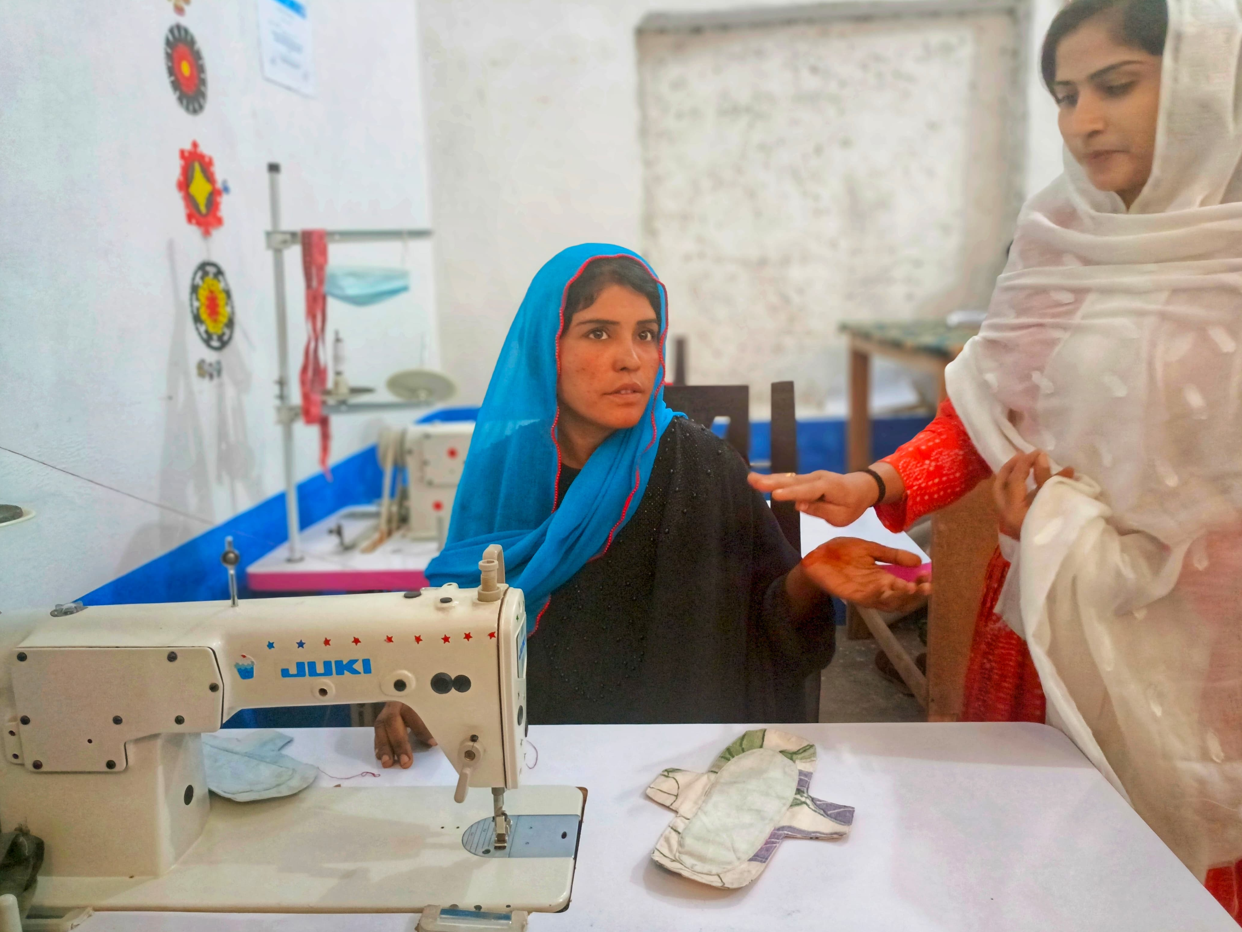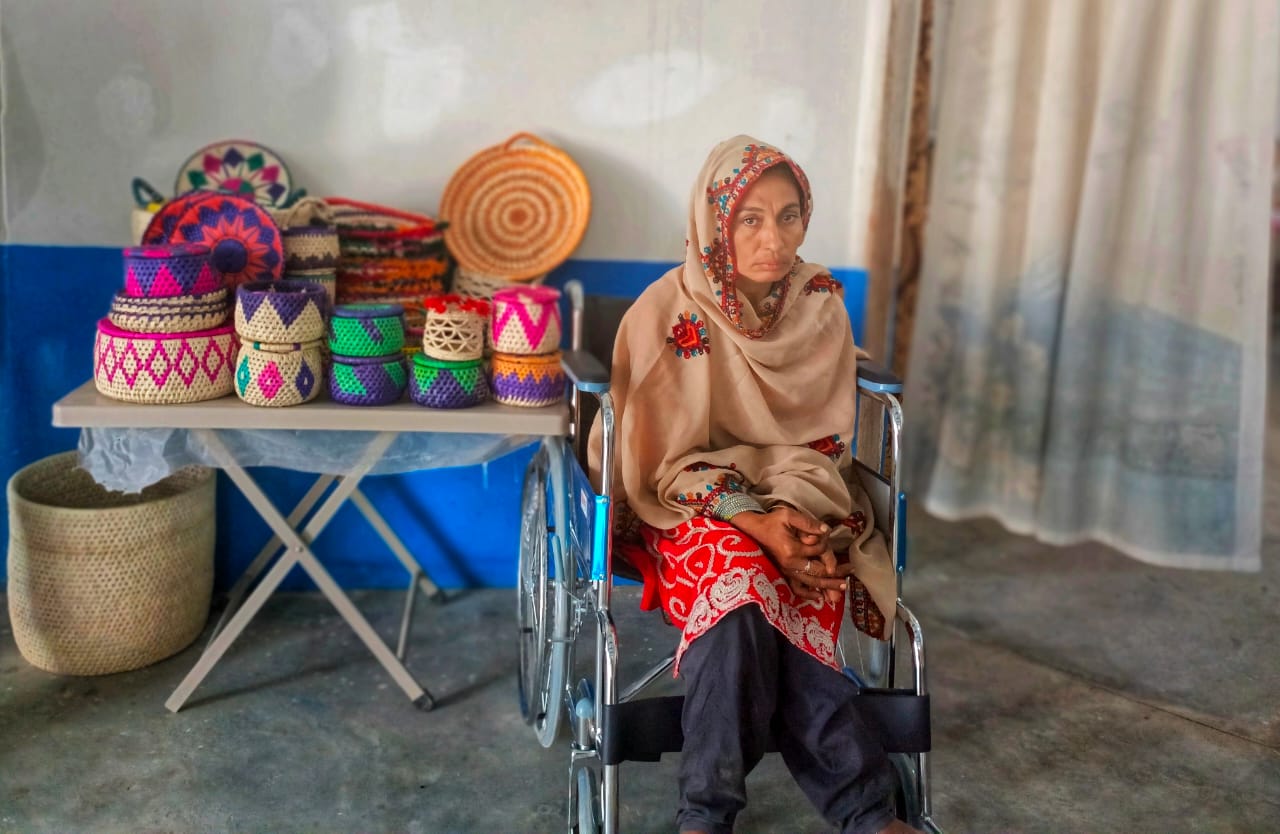Women’s Handmade Eco-Friendly Sanitary-Pads Transform Sindh’s Health
Tahira Khan
Loralai: Menstruation remains a largely neglected subject in media and everyday conversations, particularly when it comes to the concept of homemade sanitary pads.
This silence not only hinders understanding of puberty and personal hygiene but also has negative effects on the mental and physical well-being of women and girls.
When natural bodily processes are considered taboo, it can lead to the adoption of unsanitary practices, said Mala, a business entrepreneur who lives in a small village of Mirpur Khas, a district of Sindh.
Mala is one of those empowered women who promoted economic empowerment of women through handmade sanitary napkins and awareness sessions about menstrual hygiene management (MHM).
Perhaps this is both eco-friendly and sustainable because of the low-cost factor involved in the commercialization stage, Mala argued.
This could be considered eco-friendly and sustainable due to the low cost associated with the commercialization process, she added during her interview with The PenPK.
“My colleagues and I produce 5–6 reusable sanitary pads daily at a nearby women’s center. These pads can be washed and reused for approximately three months. They are affordable and available for online delivery,” Mala informed.
She earns a monthly net income of 40,000 rupees.
According to Mala, her concept of sanitary napkins is centred around three key themes: promoting women’s empowerment, raising awareness of personal hygiene, and challenging the social taboos surrounding menstruation.
Zulaikha Khanum*, a widow who supports herself by crafting handmade napkins, shared, “My husband passed away several years ago, shortly after our marriage. Despite my family’s encouragement to remarry, I declined. My sole aim is to provide a stable life for my two sons, Iqrar and Izhar. To achieve this, I enrolled in one of the centres sponsored by UN Women and produced napkins on a daily basis.”
Nighat, another worker, explained the ecological friendliness and sustainability of these pads. She detailed that handmade sanitary napkins typically comprise four layers, with the initial layer being cotton and subsequent layers containing synthetic fibres to prevent leakage and minimise skin irritation.
She highlighted that rural women often struggle to afford branded products such as Always and Butterfly. As a result, there is a higher demand for these handmade napkins due to their washable nature and hygienic properties. According to a study conducted by WaterAid and UNICEF, findings indicate that 66 percent of schoolgirls use cloth for menstrual hygiene, with 49 percent of them resorting to reuse after washing. Some opt for alternatives such as sponges, toilet tissue paper, and sawdust, which are not advisable, particularly during low flow. The study emphasises two significant factors: cost and awareness.
According to a study conducted by WaterAid and UNICEF, findings indicate that 66 percent of schoolgirls use cloth for menstrual hygiene, with 49 percent of them resorting to reuse after washing. Some opt for alternatives such as sponges, toilet tissue paper, and sawdust, which are not advisable, particularly during low flow. The study emphasises two significant factors: cost and awareness.
A single small packet containing eight pads costs more than 100 rupees, and the prevailing social taboo has hindered the dissemination of awareness on menstrual hygiene, said Naghat.
Aside from small-scale enterprises, there is no company or organisation in Pakistan directly engaged in the production of large-scale reusable sanitary napkins that are both eco-friendly and affordable for lower-income families, she added while highlighting a potential area for business.
Likewise, a research report titled “Experiences, Awareness, Perceptions, and Attitudes of Women and Girls towards Menstrual Hygiene Management and Safe Menstrual Products in Pakistan” (2023) underscores that single-use pads release volatile organic compounds (VOCs) and endocrine-disrupting chemicals, posing health risks.
The report also highlights that 90 percent of these disposable napkins are made of plastic and are disposed of in landfills, where they take over 700 years to decompose, causing environmental issues.
Read More:https://thepenpk.com/the-untold-stories-of-gbv-in-balochistan/
In the face of numerous challenges confronting Pakistan, including environmental degradation and climate change, women like Mala and Nighat offer handmade napkins as a safe alternative. However, there remains a significant journey ahead in combating this social taboo.
In Pakistan, women still lack sufficient drying facilities for their sanitary napkins after washing them. Due to prevailing social norms, women often feel ashamed while drying these napkins. They typically wash or dry the napkins at night or in secluded, damp areas that are not conducive to proper menstrual hygiene.
It is evident in our society that menstrual hygiene is not solely about using reusable fabric; rather, it is fundamentally a matter of dignity and privacy, said Dr Faryal Khan, a Lady Medical Officer (LMO) in Kacchi district.
Dr Faryal remarked that “our society tends to prioritise myths over scientific explanations. This rings true for menstruation as well. Due to deeply ingrained stigma, women, particularly young girls, are hesitant to acknowledge menstruation as a natural and beneficial monthly phenomenon. In reality, it is a sign of healthy adolescence and also occurs in pre-menopausal adult women.”
The lady medical officer added, “In low-income societies, the age of menarche is typically considered to range between 8 and 16, or 10 and 16, with the average onset age being 13 or 12.4, respectively.” Consequently, when we calculate the span between menarche and menopause, an average woman is expected to menstruate for approximately 14,000 days in her lifetime. These 14,000 days require care and proper hygiene, yet menstruation remains taboo, and women lack adequate facilities for blood absorption during this period, she further explained.
Consequently, when we calculate the span between menarche and menopause, an average woman is expected to menstruate for approximately 14,000 days in her lifetime. These 14,000 days require care and proper hygiene, yet menstruation remains taboo, and women lack adequate facilities for blood absorption during this period, she further explained.
Dr Faryal expressed her dismay, stating, “I find this lamentable on our part as a civilised society.”
In another study titled “How the Taboo around Menstruation Affects Young Girls’ Education,” it is emphasised that unhygienic menstruation practices could result in a 70 percent increase in urinary tract infections, highlighting the urgent need for action and awareness sessions.
When questioned about hygiene sessions and related infections, Nighat said that she is actively involved in spreading awareness through training sessions and door-to-door campaigns. “Initially, we distributed these handmade sanitary napkins free of charge to raise awareness about our business venture and to educate people about the drawbacks of using rugs and cloth,” she elaborated.
When it comes to personal hygiene, menstruation is often treated more as a taboo than a natural bodily process. Generally, our society overlooks menstrual hygiene, and rural women continue to rely on cloth during menstruation. And using cloth and other fabrics can lead to infections that significantly affect the urinary tract.
Read More:https://thepenpk.com/elections-vs-climate-balochistans-battle-on-two-fronts/
In Pakistan, particularly in Sindh and Baluchistan, women’s empowerment and their right to work are often overlooked. Despite this, certain women have shown remarkable courage by venturing out of their homes to provide a decent livelihood for their dependents.
Zulaikha* and Mala exemplify this confidence within our society. They have recognised their own value and have made deliberate decisions to assert their autonomy.
Despite the fact that they may face unequal access to resources and opportunities, they have broken through barriers to not only support themselves financially but also challenge societal prejudices that limit women’s freedom to make dignified choices.
The name of the widow has been changed to hide her identity.
Photo Credit: Tahira Khan
Tahira Khan is a freelance journalist from Loralai, Balochistan. She can be accessed at tahiraadamkhan@gmail.com
All information and facts provided are the sole responsibility of the writer.

Comments are closed.